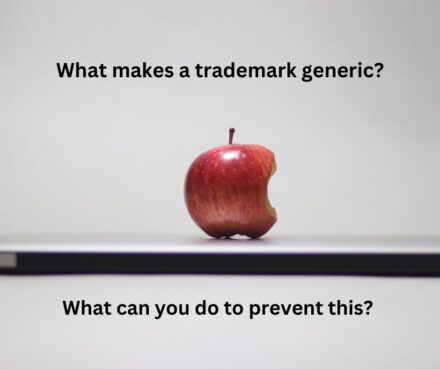
Is My Trade Mark Generic?
5th July 2023 by Tiff Elmer
As a business owner, creating a brand and securing your trade marks are essential. However, sometimes, the process of applying and getting approval can be complex and confusing. One of the most common issues that UK business owners face is whether their trade marks are generic. A trade mark is considered generic if it describes the product or service and is not distinctive enough to be identified as a unique brand or stand out in the crowd. In this article, we’ll discuss what makes a trade mark generic, the implications of having a trade mark deemed generic, and what you can do to prevent it.
What makes a trade mark generic?
A trade mark is considered generic if it merely describes the product or service and does not have any distinctive characteristics. Generic trade marks are not distinguishable and are commonly used by different brands, and so, not leading to differentiation in the marketplace. For instance, the words “apple” or “orange” could not be registered as a trade mark for fruits as they are commonly used terms for such produce. However, if you combine apple/orange with something non-related to the fruit, such as “apple” for a phone brand or “orange” for a bank, they are entitled to trade mark protection because it makes it far more distinctive.
Implications of having a trade mark deemed generic
If your trade mark is generic, it may not be approved for registration, leaving your business without any formal legal ownership and protection. Therefore, if a competitor uses a similar or the same trade mark, you may have no legal recourse to defend your trade mark rights, which could be detrimental to your business. The loss of trade mark rights, or never acquiring the rights to begin with, can also lead to loss of goodwill and reduce the value of your brand.
What business owners can do to prevent having a generic trade mark
To prevent a trade mark from being considered too generic, the brand has to indicate distinctive qualities that set it apart from competitors. Business owners can be creative and combine terms or words that are not commonly used in the industry or associate products with a slogan or tagline. This approach would promote brand identity, such as Amazon’s tagline, “A to Z.”
If initially there is a risk the mark would face generic issues, you can build more character into your mark by swapping numbers and letters around or adding symbols, colours, fonts and pictorial elements to make it stand out and look different. Business owners must also ensure that their trade marks do not infringe other businesses’ registered trade marks, so checks must be carried out from the outset and must still be considered when adding to or developing your trade mark.
If you notice your trade mark is becoming generic because it being referred to generically like in the example above with the term “hoover”, you can take steps to prevent this from happening. You could run marketing campaigns to educate the public and there are many examples of household names doing just this. For example, Velcro companies released a video across social media asking consumers, through the medium of a song, to say hook and loop and not VELCRO as the generic term. Whilst it is unlikely you will educate everyone; it raises public awareness and demonstrates action taken by you to prevent the trade mark becoming generic.
If you operate as a franchise and / or have licensed your branding to any licensees, then you could seek to enforce tighter control over the licence agreements in place in order to deal with any generic issues on a wide scale.
Trade marks are an essential part of a brand’s identity, and it is crucial to ensure that they are not considered generic. Business owners must conduct due diligence when creating and registering trade marks to ensure to maximise the likelihood of registration. Keeping trade marks unique and different from competitors can lead to better recognition, consumer loyalty and, ultimately, an increase in profitability.
We understand the requirements for registration and ways to avoid trade marks being considered generic. If you require any further information or would like to discuss any of the above further, then please contact Tiff Elmer at t.elmer@laceyssolicitors.co.uk or on 01202 377 814.



